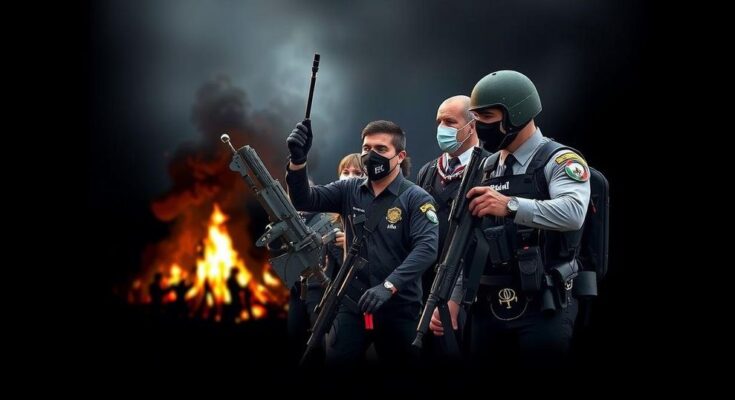Five years after the November 2019 Iranian protests saw hundreds killed by state security forces, no justice has been served as families endure harassment and imprisonment. Despite the passage of time, the horrifying reality of state violence, coupled with systematic repression of those seeking accountability, persists. International bodies are urged to investigate and take action against the ongoing impunity that allows such atrocities to continue unchecked.
Five years have passed since the explosive protests in Iran in November 2019, where security forces ruthlessly suppressed dissent, resulting in the tragic deaths of hundreds, possibly thousands, of protesters. Despite the passage of time, justice remains an elusive ideal for the families of the victims who seek accountability but face intimidation, harassment, and imprisonment instead. In a particularly stark reminder of the regime’s unyielding grip, these families have become targets for their quest for answers, illustrating a cycle of oppression that refuses to break. The mass uprising followed a sudden spike in fuel prices, igniting widespread outrage among Iranian citizens. The government’s reaction was swift and brutal, deploying a spectrum of lethal force ranging from live ammunition to helicopters against unarmed protesters. As bodies piled high and fear gripped communities, the internet was shut down, a desperate attempt to veil the extent of the massacre, resulting in an almost unbearable silence regarding the number of lives lost. Hadi Ghaemi from the Center for Human Rights in Iran poignantly captures the despair felt by many: “Five years after one of the bloodiest crackdowns in Iran’s recent history, families of the victims are still left without answers, without justice, and without acknowledgment of the state’s responsibility for these deaths.” The silence after such tragedy is deafening, showcasing the severe cost of dissent in a nation where the blood of innocence seems to carry no cost for those in power. Moreover, families continue to face the terrifying wrath of the state for daring to speak out. The chilling story of Borhan Mansournia, a young man shot during the protests, highlights the gruesome violence wrought upon the victims, whose bodies were returned to families disfigured, a haunting reminder of the grim reality of state-sponsored brutality. As his brother recalls with anguish, “All of his organs had been removed. It was a horrifying sight.” The Iranian authorities have systematically repressed families seeking justice, using tactics of surveillance and imprisonment to instill fear. The story of Pouya Bakhtiari’s family starkly illustrates this ongoing persecution, with multiple family members sentenced to lengthy prisons terms merely for attempting to demand accountability. The psychological toll is immense, as expressed by his sister, who cries out, “You took my brother’s life! My father’s life is at risk! My mother’s life is at risk! The lives of our entire family are at risk!” As global voices call for accountability, pressure mounts on international organizations like the United Nations to investigate these atrocities and hold perpetrators accountable. Ghaemi’s impassioned appeal underscores this urgency: “The time has come for the international community to stand firm and end this brutal cycle of impunity.” Against this backdrop of tragedy and unrelenting quest for justice, a profound sense of resilience emerges from the families of victims. With every new attempt to silence them, they become more determined to reveal the truth, not just for their loved ones, but for a future free from the shackles of such oppression.
The November 2019 protests in Iran were triggered by a sudden increase in fuel prices, leading to widespread unrest across the nation. The Iranian government’s response was catastrophic, employing lethal force against demonstrators, resulting in credible evidence of over a thousand deaths. As families sought justice and accountability, they faced intimidation and persecution instead, creating a dire climate of fear and repression that continues to affect the relatives of victims. The article highlights key cases, the torture of families, and calls for international action to confront these ongoing human rights violations, underscoring the urgent need for justice five years post-massacre.
In summary, five years after the horrific killings during the November 2019 protests in Iran, justice remains a distant dream for the victims’ families who face unrelenting oppression. As international calls for accountability grow, it becomes apparent that breaking the cycle of impunity is essential to prevent further tragedies. The courage displayed by these families in the face of such fear is a powerful testament to their resilience and an urgent reminder that the quest for justice still sings a haunting melody, echoing through the dust of unfulfilled promises.
Original Source: iranhumanrights.org



